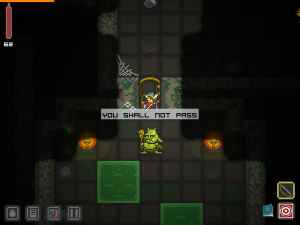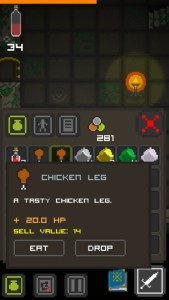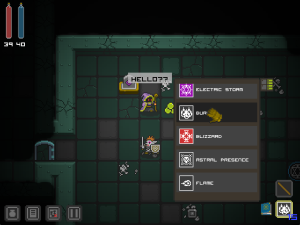Quest of Dungeons by Upfall Studios is a simple, humorous rouge-like.
You choose one of four pre-built characters and then go on a turn-based dungeon crawl.
 The goal is to pass through a set of randomly generated levels to reach the final boss of the dungeon. As is common for the genre, you can only save the game when quitting, so character deaths are permanent and you will need to replay the game many times in order to ‘beat’ it. Because of this, the focus of these sort of games are less on the completion of the story, and more focused on the enjoyment of the game mechanics creating a sort of arcade experience.
The goal is to pass through a set of randomly generated levels to reach the final boss of the dungeon. As is common for the genre, you can only save the game when quitting, so character deaths are permanent and you will need to replay the game many times in order to ‘beat’ it. Because of this, the focus of these sort of games are less on the completion of the story, and more focused on the enjoyment of the game mechanics creating a sort of arcade experience.
Quest of Dungeons opts to provide a textbook, but well made example of the genre, never really straying away from the core concept of a rouge-like. Find monsters, kill monsters, pick up loot, sell loot in randomly appearing stores, buy better equipment, find stronger monsters. The core feedback loop is well implemented and enhanced by a nice, lighthearted feel. The levels are bright, fun to travel through. The difficulty scales well, with enough variation to maintain that rouge-like edge from knowing that any fight could be your character’s last.
However, my most interesting experience with Quest of Dungeons was an out of game experience.
I first installed it on my Android and  played it like I do most mobile games: in those odd bits of time that you find during the day. A little bit while waiting at a laundromat, a little bit on a lunch break, and a more sizable session while laying down before sleeping. Throughout this time I enjoyed the game and started playing for longer sessions, often specifically making a point to play the game. I noticed that I also had the game on Steam, so I downloaded it and began to play on my desktop. The only real difference in the game is a persistent map (which I found very welcome) and the ability to use my keyboard to remove some of the inexactness of the touch screen controls. However, despite the desktop version being clearly superior in my mind, I found that I no longer enjoyed playing the game as much.
played it like I do most mobile games: in those odd bits of time that you find during the day. A little bit while waiting at a laundromat, a little bit on a lunch break, and a more sizable session while laying down before sleeping. Throughout this time I enjoyed the game and started playing for longer sessions, often specifically making a point to play the game. I noticed that I also had the game on Steam, so I downloaded it and began to play on my desktop. The only real difference in the game is a persistent map (which I found very welcome) and the ability to use my keyboard to remove some of the inexactness of the touch screen controls. However, despite the desktop version being clearly superior in my mind, I found that I no longer enjoyed playing the game as much.
This, in of itself, wasn’t surprising. The game, while fun, isn’t a incredibly deep experience so I assumed that my interest had run it’s course. When I went back and tried the mobile version a day or so later, I found that I still quite enjoyed playing the game. Switching back and forth between the two confirmed that while I both enjoyed the game on mobile, and felt the desktop version to be slightly better in features and controls, I did not enjoy playing the desktop version. I believe that the reason for this is one of the concepts at the heart of the game backlog problem itself: Opportunity Cost.
 For those who may have napped during Economics 101, an opportunity cost is a cost you pay by taking an opportunity. In this case, the cost of playing Quest of Dungeons, is that I am not playing a different game instead. On mobile, this is a cost I’m willing to pay. Even though there are other mobile games I’m currently playing, none of them provide a similar enough experience to pull my attention away from Quest of Dungeons. However, on the desktop this isn’t the case, as my options for comparable games increase and Quest of Dungeons simplicity become more of a deterrent.
For those who may have napped during Economics 101, an opportunity cost is a cost you pay by taking an opportunity. In this case, the cost of playing Quest of Dungeons, is that I am not playing a different game instead. On mobile, this is a cost I’m willing to pay. Even though there are other mobile games I’m currently playing, none of them provide a similar enough experience to pull my attention away from Quest of Dungeons. However, on the desktop this isn’t the case, as my options for comparable games increase and Quest of Dungeons simplicity become more of a deterrent.
This isn’t too big of a loss, as Quest of Dungeons seems perfectly at home on mobile, and I would encourage you to try it.
